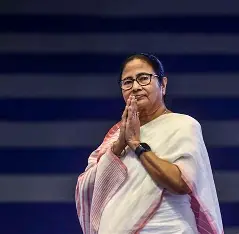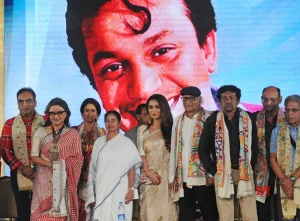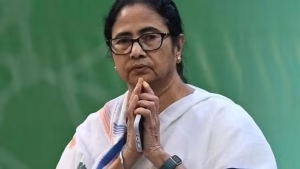West Bengal Chief Minister Mamata Banerjee has called on the entertainment industry to promote Bengali in films and television serials, urging creators to prioritize the mother tongue in content, music, and dialogue. The appeal was made during the ‘Mahanayak Samman’ award ceremony, held to commemorate the 45th death anniversary of iconic Bengali actor Uttam Kumar.
Speaking at the event in Kolkata, Banerjee emphasized the cultural importance of using the Bengali language in mainstream media. “All languages and music are beautiful, but we must make a conscious effort to promote our mother tongue,” she said, addressing a gathering of actors, directors, and musicians.
Banerjee noted that while India celebrates unity in diversity, each state has a duty to preserve its unique linguistic and cultural identity. “Every state must protect its spoken language and heritage. In West Bengal, we must cherish Bengali while respecting other languages,” she added.
Also Read : Delhi Declares Tanvi the Great Tax-Free, Supporting Inclusive Cinema and Patriotism

Request to TV and Film Producers
In a direct message to content creators, the Chief Minister urged TV serial makers and filmmakers to incorporate more Bengali songs and dialogues in their productions. She expressed concern over the dominance of Hindi tracks in Bengali serials and asked producers to consider local talent.
“We have incredible lyricists and composers in Bengal. Why not use their talent to create emotional, meaningful content?” she asked. This call to action aligns with her broader vision to promote Bengali in films, both for cultural preservation and industry growth.
Banerjee also criticized certain television content that promotes negativity, violence, or suicide. She warned producers against sensationalism driven by TRP ratings and appealed for more uplifting narratives. “Let us show the simple joys of life. Let’s inspire, not harm,” she urged.
Respect for All Languages, Priority for Bengali
While acknowledging the value of multilingual cinema, Banerjee encouraged industry leaders to give priority to Bengali content. “Please give space to other languages, but promote Bengali works first,” she said. This appeal reflects her effort to balance cultural inclusion with local pride.
Homage to Uttam Kumar and Bengali Icons
The Chief Minister paid tribute to matinee idol Uttam Kumar, calling him an evergreen legend whose presence continues to inspire generations. “Even after 45 years, we have not been able to forget Uttam Kumar—and never will,” she said. Banerjee praised his timeless performances and contributions to Bengali cinema.
She highlighted how Uttam Kumar brought to life the golden era of Bengali film, especially through unforgettable musical sequences. “He lip-synced songs with unmatched elegance. It’s rare to find his equal today,” she remarked.

Honouring Distinguished Contributors
This year’s ‘Mahanayak Srestha Samman’ was awarded to veteran filmmaker Goutam Ghosh for his outstanding contribution to Bengali cinema. Banerjee called the recognition “long overdue.”
Other honorees included celebrated singers Rupankar Bagchi and Iman Chakraborty, actor Gargi Roychoudhury, production designer Ananda Adhya, and makeup artist Somnath Kundu. Each was recognized for their work in enriching Bengal’s cultural and entertainment landscape.
“Honoring Goutamda and other respected artists is our way of saying thank you. They’ve made our state proud,” Banerjee noted.

Film Fraternity Shows Support
Prominent Bengali film personalities such as Prosenjit Chatterjee and Dev attended the ceremony. Their presence underscored the growing support for Banerjee’s call to promote Bengali in films and encourage meaningful content creation rooted in local language and values.
Insiders from the Bengali entertainment industry welcomed the Chief Minister’s message. Many echoed the sentiment that local stories, music, and language deserve a central place in today’s media.
Chief Minister Mamata Banerjee’s remarks serve as both a cultural reminder and a strategic direction for West Bengal’s media industry. Her call to promote Bengali in films is more than a linguistic appeal—it’s a cultural mission to preserve heritage, elevate artistry, and build a media ecosystem rooted in values and pride.
As the entertainment landscape continues to evolve, Bengal’s language and legacy must remain at the heart of its stories.

